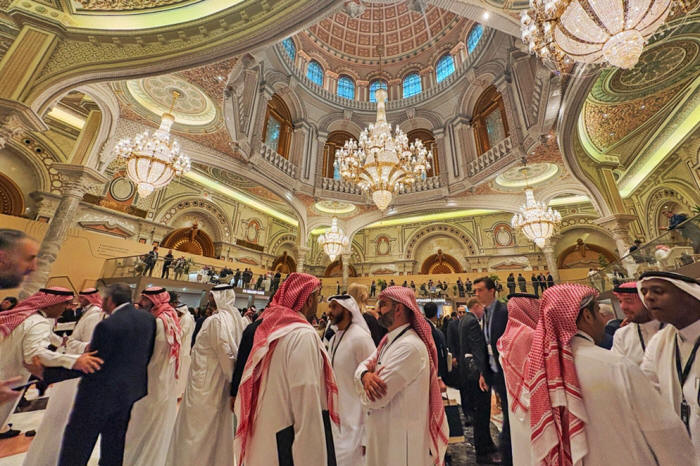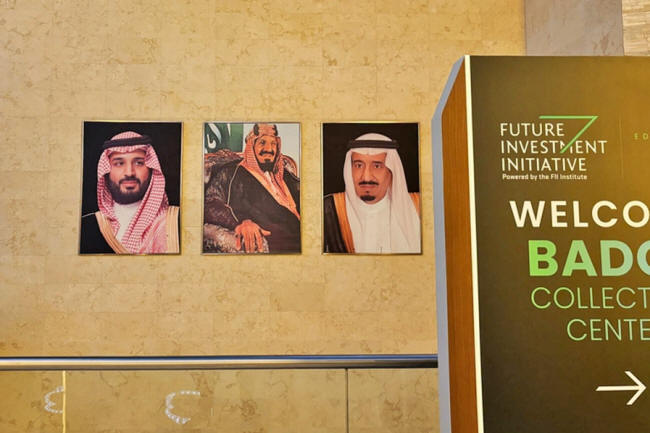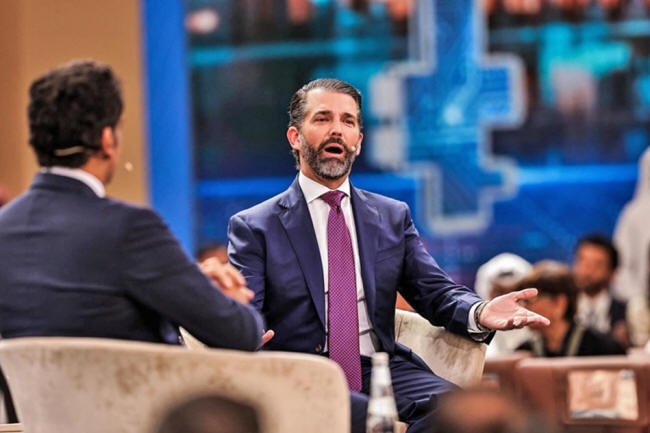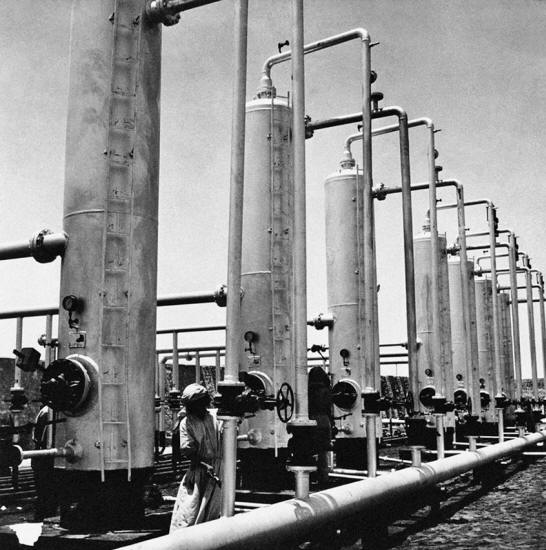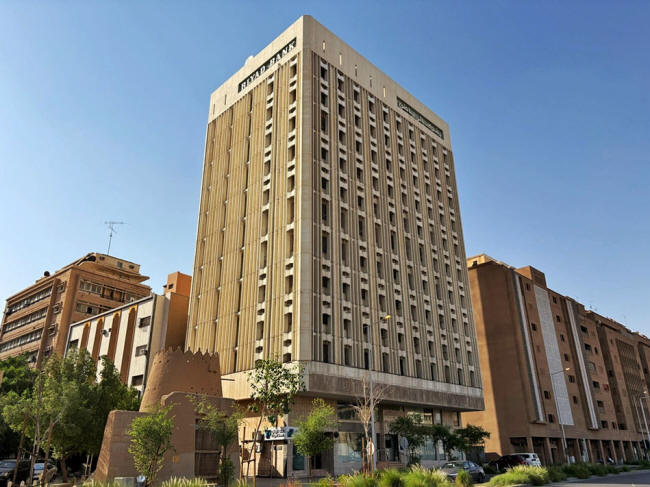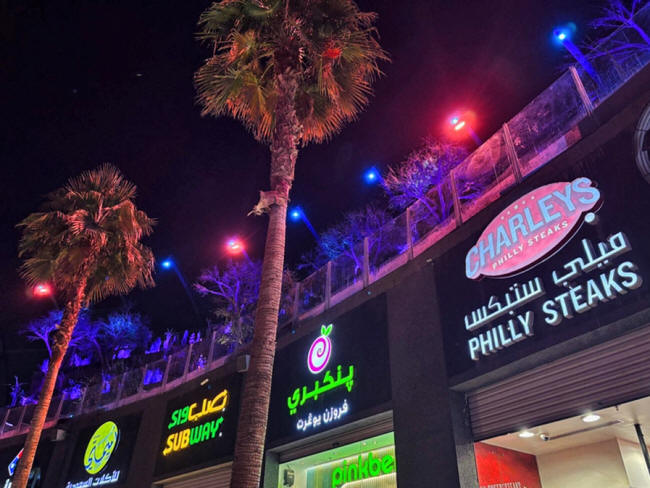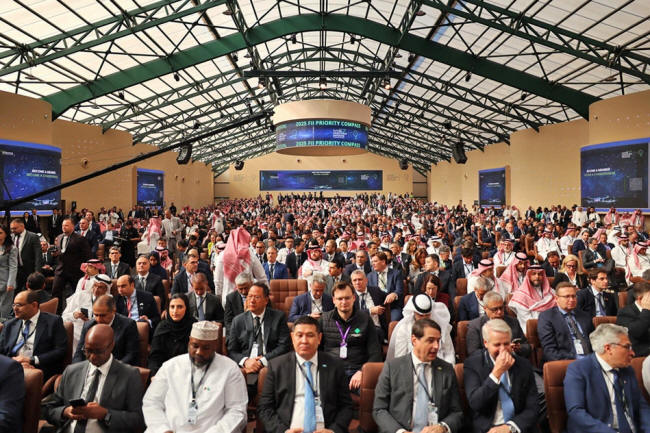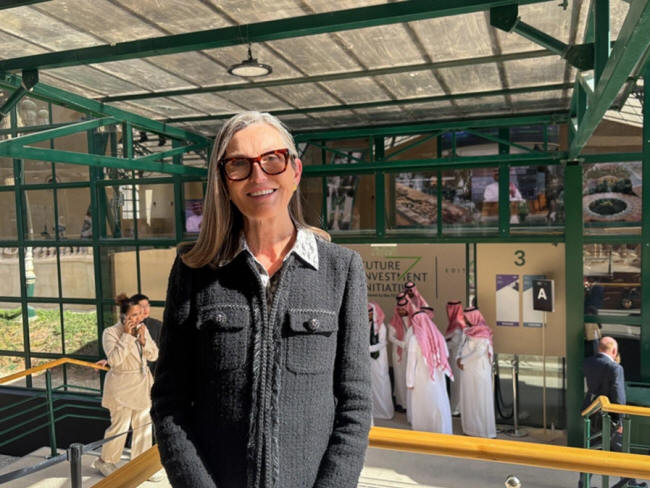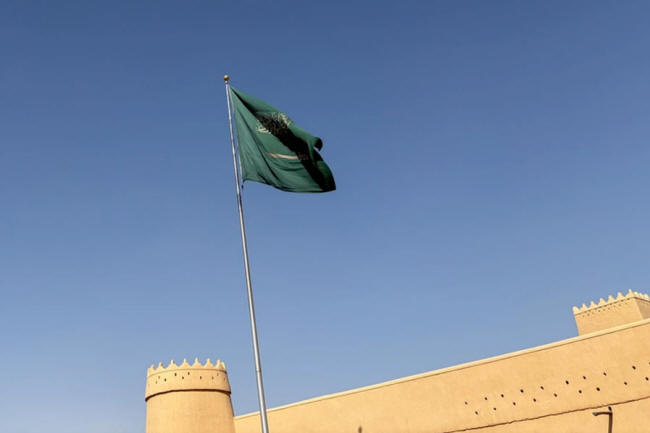|
November 07, 2025 from Politico Website
Attendees are seen at the Future Investment Initiative in Riyadh, Saudi Arabia, on Oct. 28, 2025. Sam Sutton/POLITICO
state capitalism is on the rise in both countries...
Like Donald Trump, Crown Prince Mohammed bin Salman understands the power of personal branding.
Investors and policymakers who've been coming here for decades told me that before MBS, the city was quiet, austere and medieval.
Now, it's a sprawling labyrinth of five-star hotels, luxury stores and megasized real estate developments, a metropolis that soon might rival Abu Dhabi and Dubai as a glitzy destination for financiers and tourists.
All this development was conceived and directed
by a leader who wants to exact rapid and permanent changes to his
country's economy and culture.
You can't go anywhere in the Saudi capital without seeing the face of the monarch known as MBS, left.
Sam Sutton/POLITICO
If MBS appears to be taking branding lessons from Donald Trump, the U.S. president has also adopted investment strategies similar to those used by the Saudi monarch to refashion his nation's domestic economy.
In his second term, Trump and his deputies have converted federal agencies into investment arms that direct capital to industries and companies that hew to Trump's strategic and political vision.
As in Saudi Arabia, some of those industries and companies have ties to the leader's family or allies.
And Trump has made arrangements that would, if implemented, give him control of enormous investment portfolios that might one day rival sovereign wealth funds like Saudi Arabia's Public Investment Fund, known by the acronym PIF.
Trump Jr.'s appearance at the conference - an annual gathering of Wall Street powerbrokers, global policy leaders and Saudi Arabia's financial and political aristocracy hosted by the PIF-funded Future Investment Initiative Institute - underscores how the first family's own business empire is now an extension of that vision.
In a cavernous event hall outside the Ritz-Carlton Hotel, the president's son told attendees that he views his investment firm, 1789 Capital, as a continuation of his father's America First political movement,
...and that its strategy and ethos are directly informed by the president's economic priorities.
speaks during the conference in Riyadh on Oct. 29. "The opportunity over here in the region is spectacular," he said. Fayez Nureldine/AFP via Getty Images
The investment environment that's been cultivated by MBS has yielded tremendous opportunities for bankers and asset managers eager to work hand-in-glove with his regime.
And if there's any agita in the United
States around how Trump has blurred the lines between private
enterprise, political activity and government, it's a familiar
dynamic in the Gulf.
The cross-pollination between the U.S. and Saudi
Arabia's political and commercial enterprises predates the Trump
era, of course.
The DC-3 plane that President Franklin Delano Roosevelt gifted to King Abdulaziz after the 1945 Yalta Conference led to the formation of the country's flagship airline.
Wall Street banks and asset managers with
connections across the U.S. political spectrum have counted the
Kingdom as a client for decades.
with aluminum paint to reflect the fierce desert heat at an oil field in Saudi Arabia in June 1947. AP
But those ties have grown stronger over the last decade as MBS consolidated power in a shocking purge that followed the launch of an ambitious economic agenda, known as Vision 2030, which has directed hundreds of billions of dollars toward everything from new cities and sports leagues to video game companies.
That push coincided with the easing of strict prohibitions against women and Western entertainment that limited the country's international appeal.
One CEO at the conference told me that he
couldn't recall seeing a woman when he first visited the country
more than two decades ago. That was a common refrain.
Social restrictions are plainly visible - women ride in separate subway cars - but I also saw a woman in an abaya bopping to Akon's "Smack That" while working in a bowling alley.
Handprints of celebrities like Jennifer Lopez and Mel Gibson populate walkways in one of the city's new entertainment districts. It's an authoritarian speedrun toward the cultural aesthetics of a Sun Belt suburb.
is seen in Riyadh on Oct. 26. Saudi Arabia's strip malls and shopping centers are chockablock with U.S. fast food, consumer brands and pop relics.
Sam Sutton/POLITICO
Before that, it partnered with the LIV Tour - the
Saudi-funded upstart golf league - to showcase stars like Brooks
Koepka and Patrick Reed at the president's golf clubs in Doral, Fla.
and Bedminster, N.J. Jared Kushner - Trump's son-in-law and
consigliere on Middle East politics, and who's also friendly with
MBS - counts the Saudi sovereign wealth fund as his private equity
firm's largest investor.
The firm has expanded quickly since its
"anti-woke" origins and its holdings now include stakes in several
of Elon Musk's businesses, along with the defense tech firm Anduril
Industries and the rare-earths magnets company Vulcan Elements.
Those pretenses don't really matter as much here. If anything, at least for certain regional players, the Trump family's links to the Gulf are now a point of pride.
On my Saudia Airlines flight from New York to Riyadh, an advertisement for the Trump Organization's developments with DarGlobal - featuring quick cuts of Trump family members, Gulf vistas and powerful golf swings - ran on my seatback entertainment console.
Across the aisle, behind a curtain at the back of
the airplane, men and women said salat, the ritual prayer recited by
Muslims five times a day, in a designated area for prayer.
The purpose of the conference is to strengthen the financial and geopolitical bonds between Saudi state actors
That's why the president has prioritized investment in sectors like critical minerals or manufacturing.
Afterward, I buttonholed Cantor as he walked through the conference and asked him to elaborate on the similarities he sees between Trump's economic policies and those of the crown prince.
Cantor told me that he was referring to Trump's use of the bully pulpit, specifically the president's guidance on where he would like to see capital put to work and his willingness to clear the regulatory or legal thickets that may have previously impeded investment.
Ultimately, Cantor said, that kind of leadership
and government guidance will be beneficial to the private sector. Trump's "guidance" has been much more hands-on than that.
His orders for the government to purchase stakes in private companies like the chipmaker Intel and critical minerals firms - along with his attempt to establish investment arms that would direct billions of foreign capital sourced through trade deals - clearly resembles playbooks used by MBS and other Gulf leaders.
Prior to the conference, Richard Attias - who leads the PIF-backed non-profit behind the conference - said that heads of state in the Gulf view themselves as CEOs.
Trump is similar.
To be sure, that will create opportunities for some.
Notably, sectors that Trump has identified as a priority - rare earths, pharmaceuticals and A.I. - are squarely in the wheelhouse of Trump Jr.'s strategy at 1789 Capital.
Even among hardcore capitalists attending the conference, there is an acknowledgement that governments will sometimes provide a financial buttress for companies and industries with strategic value.
There's a reasonable argument for the government capturing whatever upside is generated as the president sets new economic priorities.
In effect, by taking ownership stakes,
"The Trump administration has, and this is a bit of a joke, so please don't take this [the wrong way], insider information," said Ark Invest CEO Cathie Wood. Sam Sutton/POLITICO
Any dedicated vehicles for managing these Trump-era assets are a work in progress and there's been little word on whether the administration has long term plans for exiting any of these investments, as they had with both A.I.G. and the auto sector.
On a macro level, that lack of an exit strategy hasn't elicited much concern about the Trump administration distorting markets.
But on a smaller scale, even Trump allies have acknowledged to me that the president's flirtation with Gulf-style state capitalism could lead to changes in corporate behavior.
CEOs must consider not only Trump's priorities, but also how they might respond if, like Intel's CEO Lip-Bu Tan - whom Trump accused of having conflicts in China before ordering the purchase of a 10 percent stake in the chipmaker - they're eventually called to the White House over some perceived misstep or conflict.
Just as importantly, whatever successes the U.S. can glean from MBS's model are a function of both where Saudi Arabia is in its development and the resources that can be brought to bear by its government.
As Saudi officials made clear last week, while government spending and PIF cash provided a catalyst for the country's economic development over the last decade, the expectation is that the private sector will play a more active role in the future.
If there's any agita in the United States around how Trump has blurred the lines between private enterprise, political activity and government, it's a familiar dynamic in the Gulf. Sam Sutton/POLITICO
When I asked if the U.S. should take any lessons from how the Saudis have directed their investments, he made his preferences clear.
|


